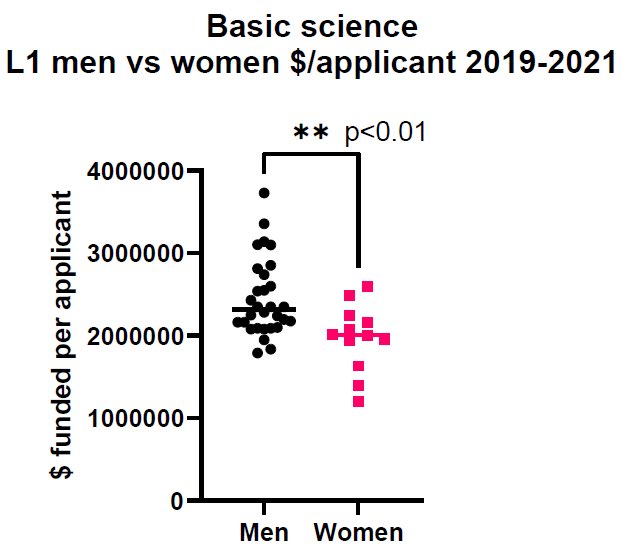NHMRC Investigator Grant outcomes were announced today. Congratulations to those successful, commiserations to those who were not. Total $ awarded here👇🏻 This 🧵 shows the breakdown of gender & disciplines in ea of the 5 fellowship levels (no data provided for non-binary) 1/6. 

These are the results for EL1. Most recipients were academic level A/B/C. One clinical male was level D as was one health services research woman. 2/6. 

These are the results for EL2 recipients. All academic levels A/B/C except for the following: Clinical: men: 1 level E, 8 level D, women: 4 level D.
Basic: men: 1 level D.
Public health: women: 5 level D. Health services research: men: 1 level E, 3 level D, women: 1 level D. 3/6.
Basic: men: 1 level D.
Public health: women: 5 level D. Health services research: men: 1 level E, 3 level D, women: 1 level D. 3/6.

These are the results for L1. Starting to look very grim for women, public health & health services 😳.
Academic levels funded:
Clinical: men: 2 x E, 4 x D; women: 3 x E, 1 x D.
Basic: men: 5 x E, 5 x D, 1 x C; women: 1 x E, 1 x D, 1 x C.
Public Health: women: 1 x E, 1 x D. 4/6.
Academic levels funded:
Clinical: men: 2 x E, 4 x D; women: 3 x E, 1 x D.
Basic: men: 5 x E, 5 x D, 1 x C; women: 1 x E, 1 x D, 1 x C.
Public Health: women: 1 x E, 1 x D. 4/6.

Now for the outcomes for L2. Unfortunately there were not many awardees, all were level E except for 1 x level D male basic researcher. It’s very disappointing to see that only one basic research woman was successful (and highly deserving of this!). Health services only one 5/6. 

Finally the L3 outcomes (all level E). It’s a huge loss for women. And collectively the data prove that retention, not recruitment, of women in STEMM research is the biggest issue Australia has. The situation has not changed for over 30 years, despite increased awareness 🤷♀️. 6/6 

• • •
Missing some Tweet in this thread? You can try to
force a refresh








